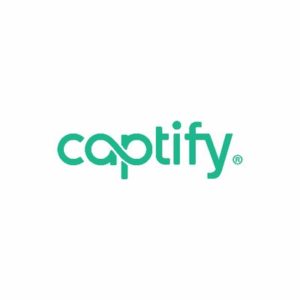 Captify is a global data activation company and pioneer of Search Intelligence. It was recently listed by Forbes as ‘The one to watch in 2017’. Their actionable insights play a crucial role for brands and advertisers; revealing macro world trends, consumer interests, inner-life behaviours and intent signals. With a presence in New York, London, Paris, Hamburg and Kiev, a global team of 160+ are powering record company growth and changing the way data is activated by marketers around the world.
Captify is a global data activation company and pioneer of Search Intelligence. It was recently listed by Forbes as ‘The one to watch in 2017’. Their actionable insights play a crucial role for brands and advertisers; revealing macro world trends, consumer interests, inner-life behaviours and intent signals. With a presence in New York, London, Paris, Hamburg and Kiev, a global team of 160+ are powering record company growth and changing the way data is activated by marketers around the world.
We caught up with their Co-founder and CEO, Dominic Joseph at the Captify villa in Cannes, who spoke about the need for the industry to break free from Google and Facebook’s duopoly:
Q) What is your blueprint for Captify going forward?
A) The number one blueprint of our business has always been the people, we have a huge focus on our team. When we started the company six years ago, the founding team and employees we had are still with us today, so they are really a family that has now grown to over 160 people around the world. The way that we are as people and the way we work together as a team is our blueprint.
Now, on a product level, our blueprint is stay very core to our business model, which is using power of search with consumer search behaviour to power media and insights for brands, because search data is such a fantastic data strength for lifting the lid on the inner life of a consumer. It helps really understanding consumer inner life interests, their attempt, all the different moments that exist in their lives, and it’s really powerful information that we can relate back to brands to help them to essentially market more effectively.
Q) How have people, brand and clients responded to Captify?
A) The clients that we have won, have come from us really adding value to what they’re doing. There is quite a few companies in this industry that they’re all using digital ad technology. We have built a business based on unique data, and unique technology.
Both provide value back to clients with this real life information and extremely high performing advertising because of the quality of what we are doing. So yes, this case of giving your clients information and access to technology that they can then use to do some unique things for their brands, and have unique strategies for their brands. That’s what we do!
Q) What are your thoughts about the industry and how do you see it evolving?
A) The industry is changing every year at the moment, there are a lot of different dynamics coming from the way that brands and agencies buy and the commercial model across all those different types of units. But I believe that the customer experience comes first, that is something that is continuing to happen now.
The world of TV and digital will start to converge and we really want to be part of that. We want to bring our data set into that TV world which hasn’t had any of this data before so that is for the effective targeting of consumers. To give them better advertising but also to use insights and measurement for TV advertising, which has been traditionally quite weak and restrictive with all measurement methods and panels. Now you have this ability to really measure across the whole country.
I think those two worlds are colliding, which is going to be a major shift in the industry.
Q) When it comes to digital and new age tech, do you think it’s more important for agencies to start building campaigns and strategies around these tools?
A) I think so. TV and digital are very interesting because TV has such a huge amount of spend going through it. Are the digital technologies or the industry trying to take the TV money? Or is it the fact that the TV money, needs to go and get the digital companies to update the way they are working? I think is that way round.
I think it is much easier for the TV companies to decide where to put their spend than it is for them to create a technology, so there is going to be a lot of consolidation in the industry as the TV companies buy a lot of digital companies. They will start to then have these fantastic digital technologies to enable them to improve their offering. We will see a huge amount of this happening across the telco’s, the big cable companies and the big TV companies in the US.
Q) The MMA and WARC recently released a report, which said that marketers in EMEA are budgeting for mobile, but the strategy and measurement are lacking. What are your thought on this?
A) There are definitely plenty of industry issues. Digital comes with a huge amount of fragmentation, and companies point solutions for different things. There is a lot of inefficiencies in the industry everywhere. We have seen huge investment over the last five years from VCs investing in all these companies and there is going to be the scale of good companies doing very well and the other companies that don’t have a real unique offering will start to struggle, something we can see happening already.
If you look at it from a brands perspective, it is very difficult for them to get their hair drown, which technology to use for which piece, so they are going to start consolidating and using less and less partners, especially the agencies. Thy don’t want to have 100 companies on their media plans anymore, they want to have a couple of companies that they know work very well for these different type of areas where they spend.
Q) If you could change one thing in the industry, what would that be?
 A) The thing that I would change would be having more females at a senior level within the industry. There needs to be a general effort from companies to support gender equality at a senior level. Looking at junior level, there is a 50/50 mix, but we definitely need more women at a senior management level and we, as a business are trying hard to do that.
A) The thing that I would change would be having more females at a senior level within the industry. There needs to be a general effort from companies to support gender equality at a senior level. Looking at junior level, there is a 50/50 mix, but we definitely need more women at a senior management level and we, as a business are trying hard to do that.
We have an initiative called be the changed, where we promote gender equality and I think it is improving. The industry is definitely taking note as we are seeing more and more initiatives across the industry and I believe there is a consistent effort to make that happen.
On an Industry level, that is a very big question, there are a thousand things that are wrong within the industry or creating problems. There are so many little inefficiencies, but they are what they are and jobs are created from those so I can’t say that’s a bad thing.
The one thing I think that is quite dangerous in the industry and that we all need to change is to make sure that Google and Facebook are not going to take everything from the Industry. They are fantastic companies with great data and great imagery but I think there is going to be more of an efforts from the publishers and the advertising industry to work together to claw a bit of that power back from the two giants.
Q) What are the current trends from the industry that most excite you?
A) There is great stuff that we are working on at the moment which is the combinations of different data searches, where we look at user search behaviour which intends what people want, what they are interested in, what their motivations are, and then combine that with real life behaviour like transaction, location data or weather data. This way you can really start to tie together the customer journey in a way which is really interesting for brands.
This is definitely a level of advertising that has never been there before, super advanced. So that’s really exciting, I think there is going to be way more innovative formats coming through over the next few years with Virtual Reality or Augmented Reality; all the way through all the different types of TV options that are coming now with the different TV solutions that are on the market. There is a lot of innovation that is about to happen right now.
Q) What are the current trends from the industry that you are not too excited about?
A) There is viability and brand safety and all these stuff that has always been around. Viability is relatively new compared to brand safety and it’s something very important for advertisers and brands. Whilst they want to be in the safe place, they want their ads to be viewable, but they shouldn’t be the primary KPIs for campaigns. They are necessary procedures that we all have to adhere to.
Q) What was your favourite project from the last year?
A) We are working on turning voice search into an understanding voice search, which is a new era for search and very interesting. The big companies like Amazon or Google are doing this and we are going to see it happening more and more.
At Captify, we are developing that and I think it is very interesting the way search advertising is now coming into a totally different type of realm with the way it comes in. But also what you can do with that data, powering things like TV, video and mobile this is stuff that is totally new and very exciting.

You must be logged in to post a comment Login